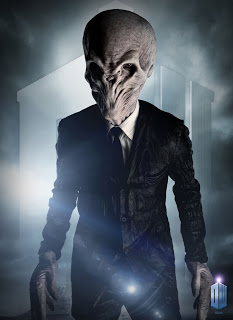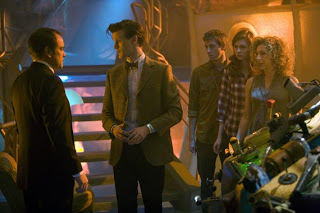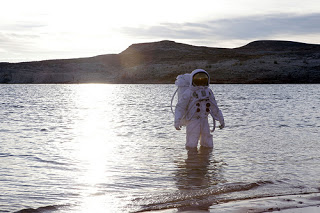But first, a little story.
Doctor Who is probably the very first thing I was an otaku for. Before I knew what anime or manga was (though I’d seen “Star Blazers” and “Speed Racer”) I was staying up late on Sunday nights, watching “Who” on WTTW in Chicago at 11:00 PM. My first Doctor was Tom Baker, and to this day he’s my favorite – but once I was a fan, I was hooked, and I watched them all. I became quite the little fanatic – I attended a few cons, bought a Dr. Who scarf (well, my parents did) and converted the rest of family – sisters, parents (Mom especially). It was quite an obsession.
“Who” ran more or less uninterrupted for 26 seasons, starting on the BBC on November 22, 1963 – the day JFK was assassinated, as it happens. There was a little 18-month hiatus in the ’80s, but that’s the only break – until 1989, when the BBC cancelled the series. There were intermittent rumors of a theatrical film, a TV revival, even an abortive TV movie “co-produced” by the BBC and Fox in 1995 starring Paul McGann. But then, in 2005, the impossible moment came – the BBC revived the series, under the direction of “Queer as Folk” creator Russel T. Davies. Now in the 6th season of it’s new incarnation, we’re already on out 3rd lead actor (I’ll assume you know how all this works) and 2nd show runner.
I think we’ve done pretty well on this second go-around, Doctor-wise. Christopher Eccelston was one of darkest Doctors, but a fascinating figure and a fine actor – but he left after only one season. David Tennant replaced him and, while he struggled at first, in my view he grew into one of the finest incarnations of the character. After three years he left, replaced by the current actor, Matt Smith – the youngest ever to fill the role at 27. More on him in a minute.
 Russell Davies is a contradiction. The debt Whovians (don’t ask) owe him is undeniable – he persuaded the Beeb to bring the series back from the dead. He undeniably made it a commercial success, even generating two spinoffs – Torchwood and the Sarah Jane Adventures (starring the incomparable Liz Sladen, who passed tragically just this week) reprising her role as the Doctor’s most beloved companion. But on some level, RTD just didn’t get Who. His shows were earthbound, too campy, generally lacking the essence of what made the series great even through 26 years of change. Fortunately his replacement was Steven Moffat – the “Grand Moff” who had written many of the best episodes of the RTD years. Now in his 2nd year, it’s clear Moff gets the series in a way RTD never did. The shows are still current, updated, different from the old show – but something of the same spirit now inhabits it again.
Russell Davies is a contradiction. The debt Whovians (don’t ask) owe him is undeniable – he persuaded the Beeb to bring the series back from the dead. He undeniably made it a commercial success, even generating two spinoffs – Torchwood and the Sarah Jane Adventures (starring the incomparable Liz Sladen, who passed tragically just this week) reprising her role as the Doctor’s most beloved companion. But on some level, RTD just didn’t get Who. His shows were earthbound, too campy, generally lacking the essence of what made the series great even through 26 years of change. Fortunately his replacement was Steven Moffat – the “Grand Moff” who had written many of the best episodes of the RTD years. Now in his 2nd year, it’s clear Moff gets the series in a way RTD never did. The shows are still current, updated, different from the old show – but something of the same spirit now inhabits it again.
With that, we’re at the premiere of S32 (or S6 if you’re a non-traditionalist). One thing is clear – Moff is a believer in big, continuous storylines (a rarity in the old Who) and likes the keep the audience guessing. Perhaps in a concession to the age and the reality that the audience for this series skews older now, the storytelling style is much less direct – it’s all about subterfuge, misdirection, and foreshadowing. Much of the groundwork fr this plot line has been laid in the last year – the mysteries surrounding companion Amy Pond, in-the-know wild card River Song, the “Time War” which wiped out the Doctor’s home planet of Gallifrey and his race, the Time Lords. As we begin, the Doctor has disappeared – but he’s sent invitations out to Amy (and hubby Rory), River, a mysterious old man and… Someone else. The invitations give a time and place – the desert in the American West, presumably 2011.
This is interesting in that it’s the first time the series has filmed in the US, and they ham it up pretty good – roadside diners, Stetson hats, six-shooters. What appears to happen is that the Doctor has invited the others – and a younger version of himself – to his own death, at the hands of an “impossible astronaut” who appears out of the middle of a lake. When the Doctor – the younger version – and his team travel back to 1969 to figure out just what his older self was up to (the others aren’t allowed to tell him for fear of blowing up the universe with a time paradox) they find there are some weird aliens involved, too – aliens who you forget as soon as you look away from them. And not just that, but a little girl who calls President Nixon (not one of the better versions you’ll see) every night, telling them that a spaceman is about to eat her. Nixon has called on rogue FBI man Canton Everett Delaware III (LOL) to figure it out – in a nice touch, father and son actors William and Mark Sheppard play the young and old versions of Delaware. When the Tardis turns up in the Oval Office, all Hell breaks loose.
If that doesn’t make sense from you I won’t even try and explain it – the mythology behind this show is so complex and has so many internal inconsistencies that you have to either do some real research or just accept it at face value. What matters now is whether it’s entertaining and whether it’s “Who”. I’d give this episode a fairly solid “yes” on both questions. It’s over-complex and doesn’t exactly play fair with the audience, and some of the facts (like the younger Doctor being 200 years younger) don’t make sense with any timeline or internal “law” I’ve seen. As for the cast, River is a character I’ve come full circle on (that’s a test of how big a fan you are, BTW). I loved her when Moffatt first introduced her with Tennant, but she’s come to annoy me now with her constant sexual innuendo and talk of “spoilers”. She feels the least like a real Who character of anyone on the show, in my view. Amy and Rory are better. I’ve always liked the dynamic of a male and female companion together, though we’ve never had a real couple before. Amy is fun – spirited, quirky and fairly resourceful. Importantly, she appears to have no romantic interest in the Doctor. One of the biggest failings of the RTD years is that the barrier that always existed between the Doctor and his companions was lowered way too much. He is an alien, after all – and that separation was important. Affection was fine – but what we saw under RTD was too much like a relationship on even terms.

As for Smith himself, now in his second season, I think he’s faring pretty well. I was worried about his age at first, but he has an “old soul” quality and an ageless look that quickly make you believe him as an 1100 year-old Time Lord. At this point he’s a bit nice for my tastes – probably, along with Peter Davison, the nicest of all the Doctors. I’d like a little more mystery, a longer glimpse into the alien nature of the character – but I can live with what I’m getting. He’s a force of nature, is Smith – all arms and legs and yet graceful (Smith was once an elite schoolboy football player).
This promises to be an interesting season, with an episode by Neil Gaiman to come, along with several more by Moffatt. As much as he likes to string the audience along, Moff is probably going to have to resolve this running plot this season – starting with some serious explanations in part 2 next week. His scripts generally pack a lot of suspense, sometimes some real scares, and he’s not afraid to take the Doctor to some dark places. That’s as it should be with this series. I don’t feel the same way about Doctor Who as I did when I was watching those late-night screenings on channel 11 – maybe it’s a bit like “As Time Goes By” in that my youthful passion has matured into a comfortable affection. But it will always hold a special place in my heart, and it’s nice to see it back – delivering some of the best drama on TV in a way that’s fairly consistent with the show I loved in my youth.




